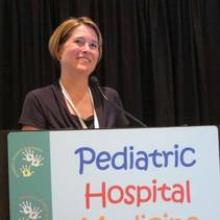COVINGTON, KY. – A national pediatric nighttime curriculum is feasible and improves resident learning and confidence, data from a national field test have shown.
The Web- and case-based curriculum was created through a massive collaborative effort and fills a global need in the wake of the 2011 Accreditation Council for Graduate Medical Education resident work-hour restrictions. Those restrictions led to a substantial increase in nighttime rotations for interns and second- and third-year residents.
Despite this shift, only 30% of residency programs had a formal nighttime curriculum by November 2010.
Nighttime rotations bring a unique challenge of delivering resident education in "an environment where there isn’t the traditional morning report, noon conference, and postcall rounds," Dr. Rebecca Blankenburg said at Pediatric Hospital Medicine 2012.
Through a collaboration of the Academic Pediatric Association, American Academy of Pediatrics, Society of Hospital Medicine, and the Association of Pediatric Program Directors, educators nationally created 30 modules based on topics determined through a literature review, a needs assessment of residency program directors, and an expert consensus.
Each module contains one case geared toward interns and one case geared toward residents, a brief 15-minute PowerPoint presentation with and without voiceover, a 1- to 2-page topic summary, and five pre- and posttest questions, said Dr. Blankenburg, a hospitalist with Lucile Packard Children’s Hospital at Stanford (Calif.) University.
A preliminary pilot test was conducted at Stanford from February to June 2011, followed by the national field test of 10 modules from July to December 2011.
The top 10 topics, selected by informal focus groups of 124 program directors, were 60% medical and 40% communication. They covered shock, respiratory distress, fever, seizures, altered mental status, pain management, handoffs, triage on the wards, communication with patients and families, and autonomous decision making.
"The focus groups felt really strongly that at nighttime, we shouldn’t be teaching things that could be taught by a content expert during the day, but rather emphasizing those teachable moments at night," Dr. Blankenburg said.
In all, 89 pediatric and combined internal medicine–pediatric residency programs participated, representing 46% of all programs nationally and involving more than 2,000 learners. Prior to the study, 84% of participating programs had no nighttime curriculum.
Although program directors anticipated that the curriculum would be taught equally between self-study computer modules, resident-led modules, and faculty-led modules, in actuality, those percentages were 47%, 29%, and 20%, respectively, with the remaining 4% conducted via other means including Skype, she said.
During their nighttime rotation, 64% of residents completed at least six modules (average, 6.8).
"The curriculum was implemented in a variety of ways, which we felt was a potential limitation in that it was a more difficult study design, but it also makes it more practical in that we will be applying this broadly," Dr. Blankenburg said.
Residents responding to confidential online pre- and postcurriculum surveys believed that the curriculum significantly improved their nighttime learning (4.7 vs. 6.4 on a 10-point scale). Confidence also increased significantly for all 10 topics and all levels of learners, she said.
Among 493 respondents, pre- and postcurriculum knowledge scores increased significantly for first-year residents (6.11 vs. 7.24) and second-year residents (6.84 vs. 7.22), but not among those in their third year (7.16 vs. 7.31).
Though there were rich comments expressing a desire for residents or faculty to facilitate the sessions, an analysis of variance revealed no significant differences in attitudes, confidence, or knowledge across teaching methods, Dr. Blankenburg said.
Some residents described the curriculum as focused, quick, effective, and pertinent to night-shift concerns. Others suggested it could be improved by having higher levels of discussion for higher-level residents, using a facilitator, and adding more topics, questions, and cases to practice the knowledge learned in the sessions. The survey indicated that "77% of residents believed the modules were most geared towards interns," but that’s not necessarily a fatal flaw. " ‘[It’s] probably more helpful in terms of knowledge for earlier in residency. The formatting, however, helped with passing info along to my PGY1 counterpart,’ " Dr. Blankenburg quoted a third-year resident as saying.
The collaborative is already at work improving the curriculum based on feedback and has funding to place version 2 of the curriculum on the interactive Web-based platform Moodle by Aug. 15, Dr. Blankenburg said. There are also plans to join forces in the coming year with educational and design students to make the curriculum more interactive.
"We’re really interested in the idea of a flipped classroom and how to have these be learning modules that residents can do on their own, perhaps, but really have applied learning activities that bring it to a higher level," she added.



